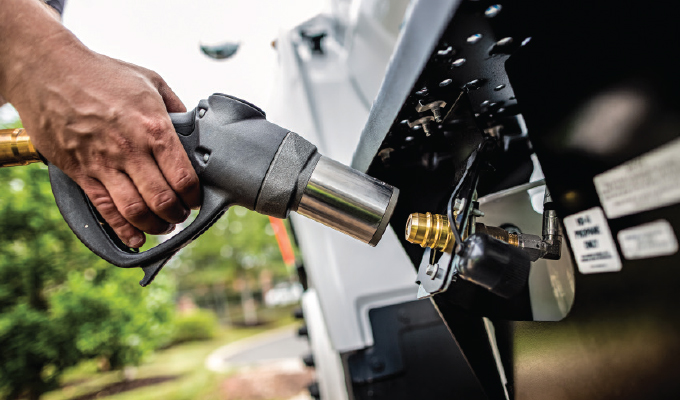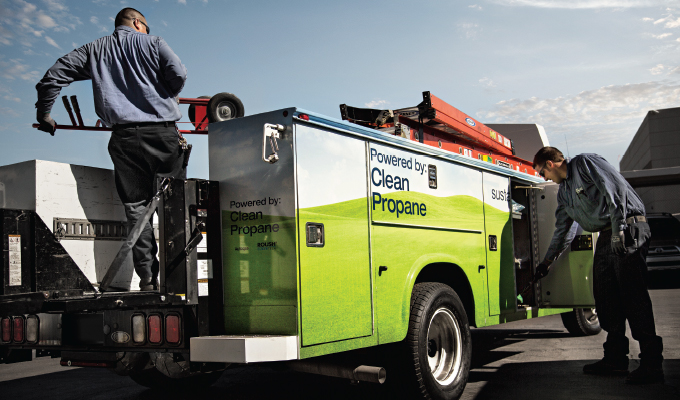By Steve Whaley
When it comes to alternative fuels, there’s a misconception that if companies want to lower emissions or meet fleet sustainability goals, they’re going to have to pay more to do it. It’s often one of the reasons fleet owners are initially reluctant to consider other energy sources besides gasoline or diesel.
But it’s time to fact check that line of thought.
Transitioning to an alternative fuel doesn’t mean that vehicle owners have to pay more to operate a clean fleet. In fact, there’s an alternative energy source available today that can reduce harmful nitrogen oxide (NOx) emissions by 96% compared to diesel and still provide fleet owners with the lowest total cost of ownership of any fuel: propane autogas.
Thanks to its low fuel and maintenance costs, propane autogas has helped many fleet owners achieve a “green” status without compromising on range or performance, while lowering their total operating costs. Here’s how.
COST OF FUEL
Historically, the cost of propane autogas itself is consistently less than both gasoline and diesel. Even as oil prices fluctuated to lower prices this spring, propane autogas can beat diesel on price per gallon by as much as 50%. The wholesale cost of propane autogas falls between the price of oil and natural gas, which are propane’s two sources. Because of this, propane autogas prices don’t fluctuate as sharply as other fuels, so fleet owners are able to more easily manage fuel budgets and meet year-end objectives.
Also, many propane autogas retailers work with fleet owners to create a contract that allows fleets to lock in a set price per gallon for the year. This is another layer of protection against fluctuating fuel prices. Because propane autogas is widely available across the US, fleet owners looking to make the switch can work with a local propane supplier who can help them select and install an affordable refueling infrastructure and develop a fuel contract to fit their needs.

MAINTENANCE COSTS
The second way many fleets realize cost savings with propane autogas is in maintenance costs. Compared to a diesel engine, maintaining a propane autogas engine is overall more cost effective and convenient. For starters, propane autogas engines require less oil by volume than diesel engines, which can decrease preventive maintenance costs at each interval over the life of a vehicle.
Propane autogas emissions systems are also less complex, and the fuel burns clean, eliminating the need for costly additional fluids and filters like diesel emissions fluid (DEF) and diesel particulate filters (DPF). Even as more low-emissions diesel technology becomes available, the added maintenance costs and inconveniences that come with this technology may be overlooked. Fleet owners spend additional time, money, and effort to maintain these emissions systems that constantly become more expensive as emission standards become increasingly more strict. Additionally, the costs associated with downtime to complete these repairs can adversely affect a company’s revenue capabilities.
Compared to gasoline, propane autogas has fewer residual contaminants to the oil that cause engine wear, and there is also less carbon buildup on the valves that naturally occurs in gasoline engines. Simply put, owners enjoy lower maintenance costs.
FINANCIAL ASSISTANCE
Although the total cost of ownership for propane autogas vehicles is substantially less without relying on financial incentives, there are several funding sources for fleets who transition to alternative fuels such as propane autogas. Earlier this year, Congress passed the Further Consolidated Appropriations Act 2020 that extended the Alternative Fuel Tax Credit. Propane autogas fleet operators who apply for the tax credit will be able to claim a credit for every gasoline gallon equivalent of propane autogas purchased, or about 37 cents per gallon. The bill not only extends the credits through December 31, 2020, but fleet owners can also apply for credits retroactively for any fuel purchases made in 2018 and 2019. Vehicle operators interested in taking advantage of these tax credits should consult their own tax advisers first regarding any claims for credits or refunds.
Additional opportunities are also available through other federal and state grants. Fleets should check with their area Clean Cities Coalition (cleancities.energy.gov) to learn more about what funding may be available where they live.
While all of these cost savings are great for the bottom line, the real benefit here is to the neighborhoods where these fleets operate. With significant reductions in harmful emissions, companies that go green with propane autogas contribute to a cleaner and healthier environment for their community.
ABOUT THE AUTHOR
Stephen Whaley is director of on-road business development for the Propane Education & Research Council. He can be reached at stephen.whaley@propane.com. Find out more, visit www.propane.com/fleet-vehicles.




